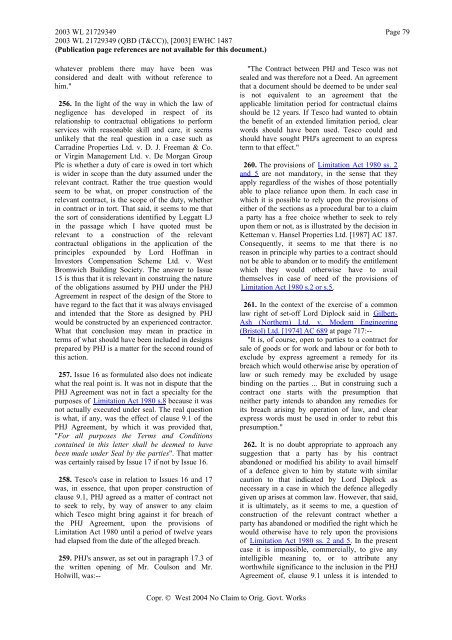Tesco v Constain - Thomson Reuters
Tesco v Constain - Thomson Reuters
Tesco v Constain - Thomson Reuters
Create successful ePaper yourself
Turn your PDF publications into a flip-book with our unique Google optimized e-Paper software.
2003 WL 21729349 Page 792003 WL 21729349 (QBD (T&CC)), [2003] EWHC 1487(Publication page references are not available for this document.)whatever problem there may have been wasconsidered and dealt with without reference tohim."256. In the light of the way in which the law ofnegligence has developed in respect of itsrelationship to contractual obligations to performservices with reasonable skill and care, it seemsunlikely that the real question in a case such asCarradine Properties Ltd. v. D. J. Freeman & Co.or Virgin Management Ltd. v. De Morgan GroupPlc is whether a duty of care is owed in tort whichis wider in scope than the duty assumed under therelevant contract. Rather the true question wouldseem to be what, on proper construction of therelevant contract, is the scope of the duty, whetherin contract or in tort. That said, it seems to me thatthe sort of considerations identified by Leggatt LJin the passage which I have quoted must berelevant to a construction of the relevantcontractual obligations in the application of theprinciples expounded by Lord Hoffman inInvestors Compensation Scheme Ltd. v. WestBromwich Building Society. The answer to Issue15 is thus that it is relevant in construing the natureof the obligations assumed by PHJ under the PHJAgreement in respect of the design of the Store tohave regard to the fact that it was always envisagedand intended that the Store as designed by PHJwould be constructed by an experienced contractor.What that conclusion may mean in practice interms of what should have been included in designsprepared by PHJ is a matter for the second round ofthis action.257. Issue 16 as formulated also does not indicatewhat the real point is. It was not in dispute that thePHJ Agreement was not in fact a specialty for thepurposes of HLimitation Act 1980 s.8 because it wasnot actually executed under seal. The real questionis what, if any, was the effect of clause 9.1 of thePHJ Agreement, by which it was provided that,"For all purposes the Terms and Conditionscontained in this letter shall be deemed to havebeen made under Seal by the parties". That matterwas certainly raised by Issue 17 if not by Issue 16.258. <strong>Tesco</strong>'s case in relation to Issues 16 and 17was, in essence, that upon proper construction ofclause 9.1, PHJ agreed as a matter of contract notto seek to rely, by way of answer to any claimwhich <strong>Tesco</strong> might bring against it for breach ofthe PHJ Agreement, upon the provisions ofLimitation Act 1980 until a period of twelve yearshad elapsed from the date of the alleged breach.259. PHJ's answer, as set out in paragraph 17.3 ofthe written opening of Mr. Coulson and Mr.Holwill, was:--"The Contract between PHJ and <strong>Tesco</strong> was notsealed and was therefore not a Deed. An agreementthat a document should be deemed to be under sealis not equivalent to an agreement that theapplicable limitation period for contractual claimsshould be 12 years. If <strong>Tesco</strong> had wanted to obtainthe benefit of an extended limitation period, clearwords should have been used. <strong>Tesco</strong> could andshould have sought PHJ's agreement to an expressterm to that effect."260. The provisions of HLimitation Act 1980 ss. 2and 5 are not mandatory, in the sense that theyapply regardless of the wishes of those potentiallyable to place reliance upon them. In each case inwhich it is possible to rely upon the provisions ofeither of the sections as a procedural bar to a claima party has a free choice whether to seek to relyupon them or not, as is illustrated by the decision inKetteman v. Hansel Properties Ltd. [1987] AC 187.Consequently, it seems to me that there is noreason in principle why parties to a contract shouldnot be able to abandon or to modify the entitlementwhich they would otherwise have to availthemselves in case of need of the provisions ofHLimitation Act 1980 s.2 or s.5.261. In the context of the exercise of a commonlaw right of set-off Lord Diplock said in HGilbert-Ash (Northern) Ltd. v. Modern Engineering(Bristol) Ltd. [1974] AC 689 at page 717:--"It is, of course, open to parties to a contract forsale of goods or for work and labour or for both toexclude by express agreement a remedy for itsbreach which would otherwise arise by operation oflaw or such remedy may be excluded by usagebinding on the parties ... But in construing such acontract one starts with the presumption thatneither party intends to abandon any remedies forits breach arising by operation of law, and clearexpress words must be used in order to rebut thispresumption."262. It is no doubt appropriate to approach anysuggestion that a party has by his contractabandoned or modified his ability to avail himselfof a defence given to him by statute with similarcaution to that indicated by Lord Diplock asnecessary in a case in which the defence allegedlygiven up arises at common law. However, that said,it is ultimately, as it seems to me, a question ofconstruction of the relevant contract whether aparty has abandoned or modified the right which hewould otherwise have to rely upon the provisionsof HLimitation Act 1980 ss. 2 and 5. In the presentcase it is impossible, commercially, to give anyintelligible meaning to, or to attribute anyworthwhile significance to the inclusion in the PHJAgreement of, clause 9.1 unless it is intended toCopr. © West 2004 No Claim to Orig. Govt. Works
















